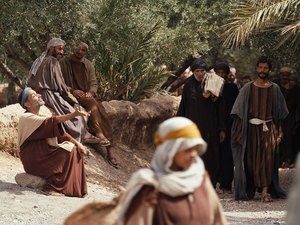The reflection on the Sunday celebration is usually focused on one of the readings.
 However, this Sunday, the Responsorial Psalm (Psalm 95:1-2,6-9) has been chosen.
However, this Sunday, the Responsorial Psalm (Psalm 95:1-2,6-9) has been chosen.
The text calls to us in these words:
“Today, if you hear his voice,
do not harden your hearts.”
This text could be interpreted as some kind of advice, a recommendation, or an exhortation.
But there is a ‘IF’… if you hear…
It implies that you may, or you may not, perceive that God is speaking to you…
But there is a different translation available and what it says is somehow different:
“If only you would listen to God today,
do not harden your hearts…”
It expresses something of a regret, it has the tone of a lamentation.
As if the writer realizes that, somehow, his people are not listening to God.
The author of the Psalm may imagine the blessings that those who listen to God would receive.
He possibly regrets that those who fail to listen will miss much…
He may be aware of what happens to those who are attuned to God’s voice –
how they come to know God, and they may then draw closer to him.
In both instances, the writer insists, adding:
“Do not harden your hearts…”
This may be a recurring temptation: not to pay attention, not to listen to God speaking to us.
We may be drawn by many other voices…
seduced by different invitations…
tempted to follow other calls…
We do as if…
As if God did not really speak.
As if his message was not truly addressed to us personally.
As if his words did not concern our own situation.
Hardening our hearts can be a slow, a subtle process,
but it can lead us very far from what we would like to become…
If only we would listen…
Note: Another text is available on a different theme, in French, at: https://image-i-nations.com/23e-dimanche-de-lannee-a-2023/
Source: Image: Stray Thoughts (Barbara Harper)

 Our lives are woven with all kinds of relationships:
Our lives are woven with all kinds of relationships:
 It is a little what we see in today’s 1st reading where the prophet Jeremiah is not eager for God to come too close! (Jeremiah 20:7-9).
It is a little what we see in today’s 1st reading where the prophet Jeremiah is not eager for God to come too close! (Jeremiah 20:7-9). It is interesting to note that God himself is ready to go along with the ‘credit option’ in our favor!
It is interesting to note that God himself is ready to go along with the ‘credit option’ in our favor! 








